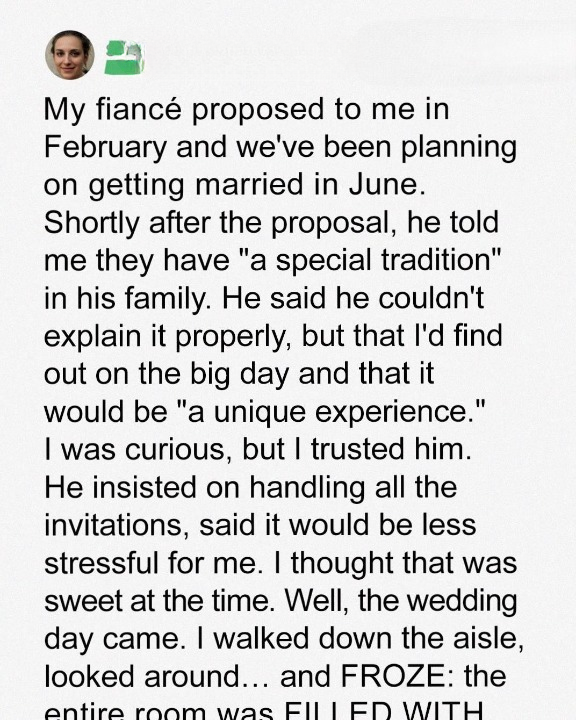Hannah had spent months imagining the moment she’d walk down the aisle — the flowers, the music, the man waiting for her at the altar. Luke had always said he wanted to handle the details himself, calling it part of a “family tradition” she’d learn about on their wedding day. It sounded romantic at first — mysterious, even. But as the big day approached, a small voice inside her whispered that something felt off. Still, she silenced her doubts, trusting that the man she loved would never turn their wedding into something she didn’t understand.
The morning of the wedding, Hannah woke with a mixture of excitement and unease. She let the stylists do her hair and makeup while trying to shake off the nervous flutter in her stomach. Her best friends called repeatedly, eager to see her before the ceremony, but she assumed they would be at the church when it was time. Every little detail she had dreamed about seemed real — except for the nagging sense that she didn’t have the full picture.
The moment Hannah stepped into the church, her dream shattered. The pews were full, but something was terribly wrong — every face staring back at her belonged to a man. Her dad, uncles, cousins, Luke’s family… but no women. Her mother, sister, and best friends were nowhere to be found. Confused, she turned to Luke’s father, who smiled politely and said, “It’s our family tradition — the men witness the ceremony, the women celebrate elsewhere.” In that instant, Hannah realized she hadn’t been part of a surprise. She’d been kept in the dark.
Her heart raced as she tried to comprehend the situation. Whispers of “tradition” and “family” floated in the air, but they felt hollow, oppressive. The men around her nodded in approval, expecting her to comply with something she hadn’t agreed to. Every instinct screamed that this wasn’t about love — it was about control.
Hannah’s mind went back to the months leading up to the wedding: the subtle dismissals when she suggested ideas, the casual brushing aside of her opinions, and Luke’s insistence that “he knew best.” It all clicked now. The “tradition” Luke was proud of wasn’t about celebration or joy; it was about dominance and secrecy.
Heart pounding, she excused herself and walked outside, the cool air shocking her senses. Pulling out her phone, she called her mother, who answered in panic. “Honey, we’re at another hall — they said this is where the women go. We don’t understand what’s happening.” Relief and clarity washed over Hannah in equal measure. She knew, with absolute certainty, that she couldn’t go through with it.
The wedding bells rang behind her, a cruel soundtrack to a life she almost accepted. Taking a deep breath, she lifted her gown and walked with purpose, each step a reclaiming of her voice, her agency, and her dignity. She didn’t look back, knowing that hesitation would mean submitting to someone else’s control.
Still in her wedding dress, Hannah arrived at the venue where the women had been taken. The room fell silent as she stepped inside, her veil slightly askew, eyes glistening. She raised a glass and said softly, “To love that includes, not excludes.” Cheers erupted, a chorus of solidarity and affirmation. Her mother embraced her, and her sister whispered, “We’re so proud of you.”
That night, Hannah, her mom, and her sister sat in a small hotel room eating pizza and laughing through tears. For the first time all day, she felt the weight lift from her shoulders. She realized that sometimes the most powerful ceremonies aren’t performed in churches, but in moments of courage and clarity.
The next morning, Hannah shared a single post on social media that quickly went viral: “I didn’t get married yesterday — I found my voice instead.” Messages of support poured in from around the world — strangers thanking her for speaking up, sharing similar stories of control, and celebrating her bravery.
In the weeks that followed, Hannah reflected on what had almost been lost. She realized that love should never feel like a secretive, exclusive club, and that true partnership thrives on respect, openness, and equality. The day she walked out in her gown became her own personal ceremony — one of empowerment, choice, and self-respect.
Hannah’s story inspired many to rethink their own boundaries and expectations in relationships. For her, the decision to walk away wasn’t a failure; it was a declaration that her voice mattered, her consent was non-negotiable, and that traditions should never come at the expense of love, respect, or autonomy.
